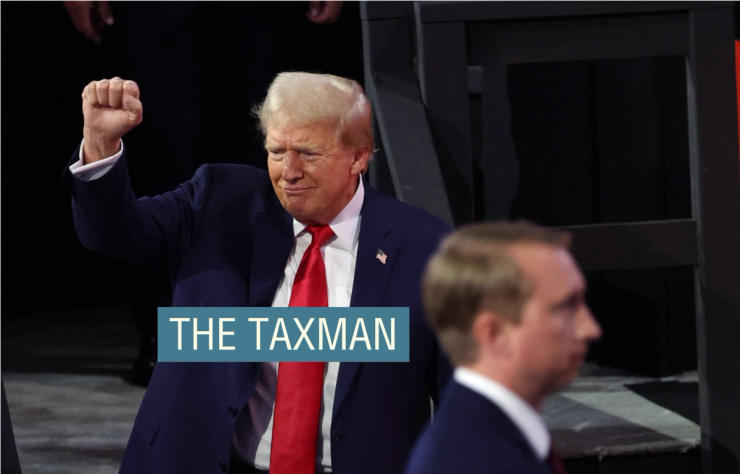The News
Former President Donald Trump said he’d support cutting the corporate tax rate to 15% from its current level of 21%, a move Sen. JD Vance said he opposed two months ago before he became Trump’s running mate.
That difference reflects the difficulties in reconciling their ideologies, giving corporate America a bit of whiplash. The Ohio Republican has fashioned an image as an economic populist willing to confront Wall Street and other industry titans, which has unnerved some chief executives.
“I would like to get it down to 15 [percent], if we could, because that would put us in the absolute lowest in terms of incentive,” Trump told Bloomberg Businessweek in an interview published Tuesday. He also said he’d be okay with a 20% corporate rate for “simplicity reasons.”
It contrasts with Vance’s resistance to further cut the corporate tax rate. “We’re sort of in line with the OECD right now,” Vance told Semafor in early May, referring to the Organization for Economic Cooperation and Development. “I don’t think we need to be cutting the corporate tax rate further.”
Spokespersons for the Trump campaign and Vance’s Senate office did not immediately return a request for comment.
Meanwhile, some Republicans insist there is no daylight between Vance and Trump, despite the senator’s reputation for bucking party orthodoxy on economic issues. “President Trump has a platform… the top two things are deregulation and tax cuts,” Kevin Hassett, a former Trump White House economic advisor, told Fox Business. “Senator Vance is 100% on board with the Trump agenda.”
In this article:
Know More
In 2017, Trump originally sought a 15% corporate tax rate as part of his major policy push to overhaul the tax code. Some Republicans in Congress balked at that proposal for its potential to increase the national debt, a problem that has only gotten worse in the seven years since then.
“The fact he’s back to 15% should not be a surprise,” Grover Norquist, president of Americans for Tax Reform, told Semafor, arguing it is “pro-growth.” He added he’s lobbied Trump advisors on a corporate rate as low as 14% to distinguish the US from European nations, which are moving ahead with a 15% global minimum tax on the profits of multinational companies.
Economists offered differing estimates to Semafor for the cost of a six-point reduction in the corporate tax rate, ranging from $700 billion to $910 billion over 10 years, per Kyle Pomerleau of the American Enterprise Institute and Ernie Tedeschi of the Yale Budget Lab, respectively. Their projections don’t factor in interest payments, which have spiked in recent years. Corporate profits have boomed in the aftermath of the pandemic.
Dropped from the party’s platform at the Republican National Convention this week: Any mention of curbing the deficit, long a centerpiece of the GOP. And in a party that has traditionally favored big business over workers, Teamsters President Sean O’Brien castigated companies like Amazon during a provocative speech at the Republican convention on Monday evening.
The View From Democrats
Democrats are eager to campaign on contrasting Trump’s agenda with that of President Joe Biden, who is pushing higher taxes for the wealthiest earners and large corporations to finance new programs in healthcare, childcare, and education.
“Donald Trump’s agenda is giveaways to big corporations, while increasing costs and taxes on the middle class by thousands of dollars,” Biden campaign spokesperson James Singer said in a statement to Semafor. “Joe Biden believes the wealthy and big corporations should pay their fair share and is fighting to lower costs for American families.”
An analysis from Brendan Duke and Will Ragland at the Center for American Progress Action Fund, a liberal group, estimated that slashing the corporate rate to 15% would provide an annual $48 billion tax cut to the largest 100 US companies.


